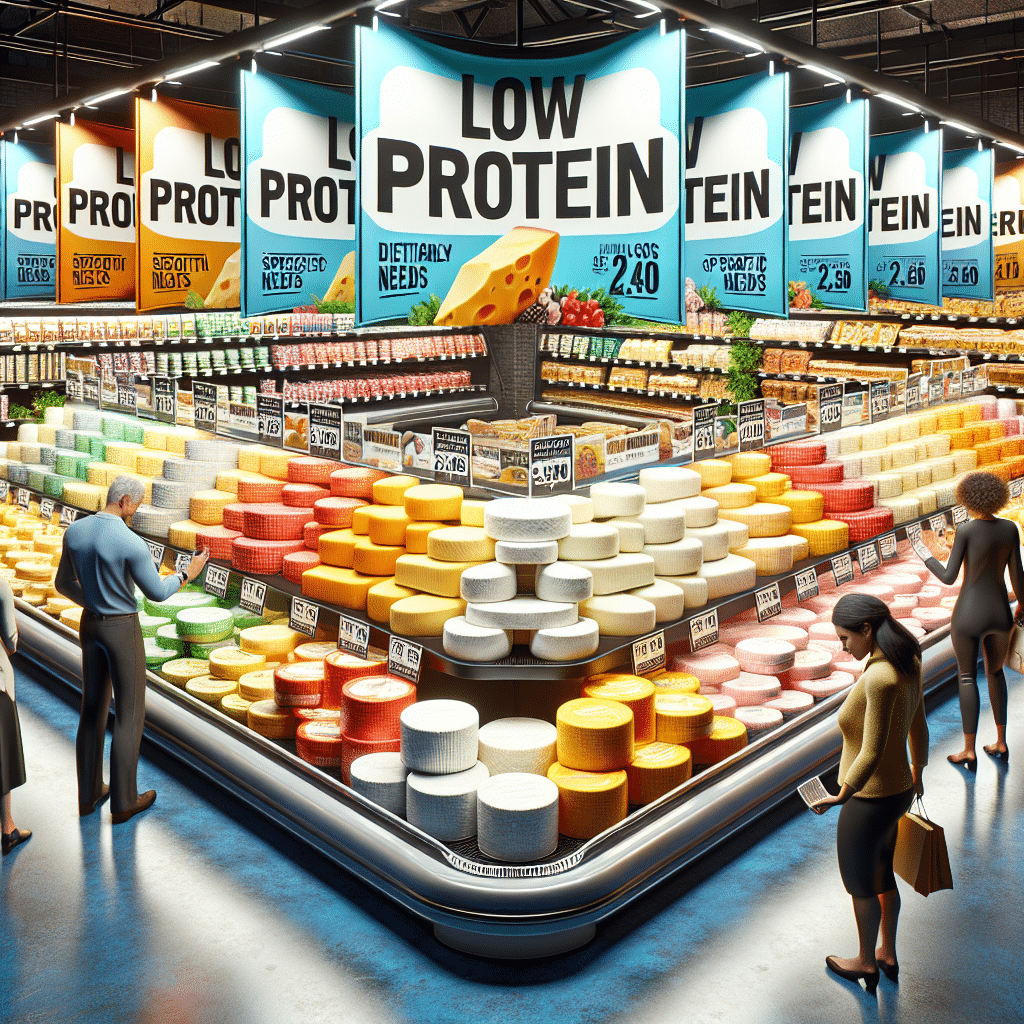Low Protein Cheese: Dietary Choices for Specific Health Needs
-
Table of Contents
- Low Protein Cheese: Optimal Choices for Health-Specific Diets
- Understanding Low-Protein Diets
- The Role of Cheese in Low-Protein Diets
- Types of Low-Protein Cheese
- Nutritional Considerations
- Benefits of Low-Protein Cheese
- Challenges and Considerations
- Case Studies and Success Stories
- Statistics and Research
- Conclusion: Embracing Low-Protein Cheese for Health
- Discover ETprotein’s High-Quality Protein Products
Low Protein Cheese: Optimal Choices for Health-Specific Diets

When it comes to dietary choices, individuals with specific health needs often have to navigate a complex landscape of food options. One such group includes those who require low-protein diets due to medical conditions such as kidney disease or phenylketonuria (PKU). For cheese lovers, this can pose a particular challenge, as cheese is typically high in protein. However, low-protein cheese alternatives offer a solution, allowing for dietary variety without compromising health.
Understanding Low-Protein Diets
Before delving into low-protein cheese options, it’s essential to understand why some individuals need to follow a low-protein diet. Conditions that may necessitate such dietary restrictions include:
- Chronic kidney disease (CKD)
- End-stage renal disease (ESRD)
- Phenylketonuria (PKU)
- Liver disease
- Inherited metabolic disorders
For these individuals, consuming high amounts of protein can lead to an accumulation of waste products in the blood, which can be harmful if the kidneys or liver are not functioning correctly.
The Role of Cheese in Low-Protein Diets
Cheese is a staple in many diets, known for its rich flavors and nutritional benefits. However, traditional cheeses are high in protein, which can be problematic for those on protein-restricted diets. This is where low-protein cheese alternatives come into play.
Types of Low-Protein Cheese
Several types of low-protein cheese alternatives are available on the market, catering to different tastes and dietary needs:
- Rice-based cheese
- Almond cheese
- Coconut cheese
- Soy cheese
These alternatives are designed to mimic the taste and texture of traditional cheese while providing a safer option for those who need to limit their protein intake.
Nutritional Considerations
When choosing a low-protein cheese, it’s crucial to consider the nutritional profile beyond just the protein content. Factors such as sodium, phosphorus, and potassium levels are also important, especially for individuals with kidney disease. Additionally, some low-protein cheeses may be higher in carbohydrates or fats, which should be taken into account when managing overall dietary intake.
Benefits of Low-Protein Cheese
Low-protein cheese alternatives offer several benefits:
- Allowing individuals with protein restrictions to enjoy cheese flavors
- Providing a safer option for those with kidney or liver conditions
- Offering a variety of choices to prevent dietary boredom
Challenges and Considerations
While low-protein cheese alternatives are beneficial, there are challenges to consider:
- Availability: Low-protein cheese may not be as widely available as traditional cheese.
- Cost: Specialty dietary products can be more expensive.
- Taste and Texture: Some may find that low-protein cheese alternatives do not fully replicate the taste and texture of traditional cheese.
Case Studies and Success Stories
There are numerous success stories of individuals who have successfully incorporated low-protein cheese into their diets. For example, a case study might highlight a patient with CKD who was able to maintain their love for cheese while managing their condition through the use of low-protein alternatives.
Statistics and Research
Research on low-protein diets and their impact on kidney disease has shown positive outcomes. For instance, studies indicate that a low-protein diet can help slow the progression of CKD and improve quality of life. The availability of low-protein cheese alternatives plays a role in making these diets more palatable and sustainable for patients.
Conclusion: Embracing Low-Protein Cheese for Health
In conclusion, low-protein cheese alternatives provide a valuable option for individuals with specific health needs who must adhere to a low-protein diet. By offering a range of choices and flavors, these products help ensure that dietary restrictions do not equate to a loss of enjoyment in eating. As the demand for specialized dietary products grows, the availability and variety of low-protein cheese options are likely to expand, making it easier for individuals to manage their health conditions without sacrificing taste.
Discover ETprotein’s High-Quality Protein Products
If you’re looking for high-quality protein options that cater to various dietary needs, ETprotein offers a range of plant-based protein products. Their selection includes organic rice protein, clear rice protein, pea protein, and more, all characterized by a neutral taste and non-GMO, allergen-free attributes. Whether you’re involved in the food and beverage industry or looking for nutritional supplements, ETprotein has solutions to meet your protein requirements.
About ETprotein:
ETprotein, a reputable plant protein vegan protein Chinese factory manufacturer and supplier, is renowned for producing, stocking, exporting, and delivering the highest quality organic bulk vegan protein and plant proteins. They include Organic rice protein, clear rice protein, pea protein, clear pea protein, watermelon seed protein, pumpkin seed protein, sunflower seed protein, mung bean protein, peanut protein etc. Their offerings, characterized by a neutral taste, non-GMO, allergen-free attributes, cater to a diverse range of industries. They serve nutraceutical, pharmaceutical, cosmeceutical, veterinary, as well as food and beverage finished product distributors, traders, and manufacturers across Europe, USA, Canada, Australia, Thailand, Japan, Korea, Brazil, and Chile, among others.
ETprotein specialization includes exporting and delivering tailor-made protein powder and finished nutritional supplements. Their extensive product range covers sectors like Food and Beverage, Sports Nutrition, Weight Management, Dietary Supplements, Health and Wellness Products, and Infant Formula, ensuring comprehensive solutions to meet all your protein needs.
As a trusted company by leading global food and beverage brands and Fortune 500 companies, ETprotein reinforces China’s reputation in the global arena. For more information or to sample their products, please contact them and email sales(at)ETprotein.com today.














